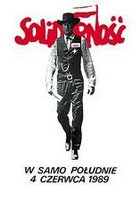
Home_____Gunslingers, Eastern Europe Style
In the classic Western, Shane, Alan Ladd rides off into the sunset,wounded, after clearing a valley of its evil men. Little Joey, Brandon de Wilde, runs after him, shouting, "Shane! Come back Shane!" But the honorable gunman has already told the boy a man is what he is and you can't break the mold. He did what any brave man had to do, save good settlers from Ryker, the rancher-baron who would drive them off their land.
In A Polish dictionary Shane yields this definition: a psychologically credible personification of goodness.
In parts of communist-ruled Poland the posters billed the movie as The Man From Nowhere, escaping the censors because nowhere was code for a country overrun by aggressors for hundreds of years; it meant a nation become lost in history.
In High Noon, as Sheriff Will Kane, Gary Cooper can't get any townsmen to stand with him on main street against the guys in black hats. He nervously checks his ammunition, looks at the clock, sees it nears high noon and his rendezvous with fate. In this 1952 classic the stakes are clear, good against evil, honor against dishonor, community against villainy.
In Poland, out of nowhere, a lone electrician rode into town one day, name of Lech Walesa. He wore a white hat and turned his smoking oratory against the bad guys. Unlike Shane, or Sherrif Will Kane, he was a member of a community rather than a lone gun slinger. Solidarity became a mass movement.
The image of Gary Cooper became a metaphor for the many, not the one. He strides courageously forward, ballot in hand, supported by the banner of Solidarity, headed for a showdown with the old regime at high noon.
It was all classic black and white, them against us, good versus evil, the underdog fighting the overdog. After Solidarity, things were never again that clear. Lech Walesa assumed shades of gray and stands in dirtier hues, founding new injustices to replace those he came to remove.
The Western itself has faded into the sunset, and is regarded as a bit corny, too unsophisticated, rather simplistic. It can't sustain itself against a post-modern world of moral compromises, deep ambiguities, and existential uncertainties.
At one time in Poland, Western movie posters were coded emblems of subversive dissent. After 1989, newer and brighter Hollywood tales have made their way into the East, these without the mythic implications of American beliefs and values in their hey day. They reflect a new American myth, of people out for a good time, a good kill, a good snort, a good f**k, but not an America that holds anything truly dear.
Today in Poland and the East, people like Lech Walesa would perhaps have a harder time finding suitable Hollywood counterparts in American movie posters because the posters would reveal both them and Hollywood as morally uncertain as they truly are.
